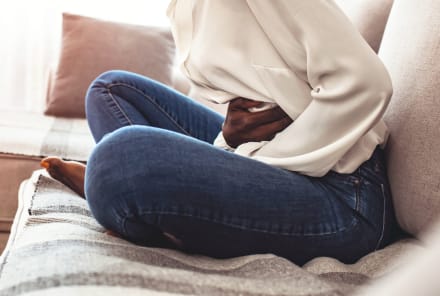Advertisement
Turns Out, Your Alertness Level In The Morning Isn't Genetic (It's Within Your Control)


Unpacking your a.m.
This study, which was published in the journal Nature Communications, flips what many of us thought we knew on its head. Apparently, being a morning person might not have anything to do with your genes; instead, this research shows that three individual lifestyle factors are what actually affect your morning state of mind.
The researchers analyzed data from 833 adults over a period of two weeks. During the study period, the participants wore a sleep- and activity-tracking watch and a device that continuously measured their blood sugar levels throughout the day.
Every morning, the study participants ate the same breakfast, but the nutritional breakdown of their meals changed throughout the two weeks.
The participants were also asked to track their food intake and alertness on a scale of 0 to 100 on an app specifically designed for this study.
The study included genetically unrelated adults but also twins in an effort to unpack whether genetic factors might be at play.
Do morning people actually exist?
The results revealed a lot about what might really be at play when it comes to morning grogginess and lethargy.
Three factors positively affected morning alertness more than any others: sleeping longer and later into the morning, eating a breakfast high in complex carbohydrates but low in sugar, and getting exercise the day before.
After analyzing the data from all the different meals, activity levels, and sleep logs, the researchers homed in on these three factors being the most important.
Interestingly, all three of these factors—sleeping longer and later, having a high-complex-carb breakfast, and getting exercise—affected morning alertness independently, which means doing even one of those things could help you hit the ground running in the morning, no matter your natural sleep schedule.
Get up and at 'em
This study taught us a lot about what's really affecting our ability to start our day with a little gusto. Fortunately, the three factors above are all under our control. If you want to maximize your morning alertness, here are some tips:
Sleep In
"Considering that the majority of individuals in society are not getting enough sleep during the week, sleeping longer on a given day can help clear some of the adenosine sleepiness debt they are carrying," senior author Matthew Walker, Ph.D., a Berkeley professor of neuroscience and psychology, said in a statement.
If you want to wake up and hit the ground running, waking up earlier than usual may not be the best strategy for productivity first thing in the morning. A better strategy may be to sleep in a little later and maximize productivity then.
To get high-quality sleep, try a sleep supplement designed to help you sleep longer and wake up more refreshed. Here are nine effective options that earn rave reviews.
Exercise
It seems like exercise benefits nearly all aspects of our health and wellness, and morning alertness is no exception. As Raphael Vallat, Ph.D., another author of the study, explains in a statement: "It may be that exercise-induced better sleep is part of the reason that exercise the day before, by helping sleep that night, leads to superior alertness throughout the next day."
To get started, here are 14 home workouts for all fitness levels.
Eat a good breakfast
This study showed that out of all the breakfasts tested, a breakfast rich in complex carbohydrates and moderate protein led to the best morning alertness and sustained alertness throughout the day. "A breakfast rich in carbohydrates can increase alertness, so long as your body is healthy and capable of efficiently disposing of the glucose from that meal, preventing a sustained spike in blood sugar that otherwise blunts your brain's alertness," Vallat said.
Some great complex carbs include fruit, whole grains, sweet potatoes, and chia seeds. Here are 16 more high-protein breakfasts to start your day right.
The takeaway
A new study showed that being a morning person has more to do with your lifestyle than your genes. If you struggle with morning grogginess, three practical ways to improve your alertness in the morning are to sleep in, exercise, and eat a healthy breakfast.
Setting and sticking to a regular sleep schedule is also key for deeper sleep and more energized mornings.
Watch Next
Enjoy some of our favorite clips from classes
Enjoy some of our favorite clips from classes
What Is Meditation?
Mindfulness/Spirituality | Light Watkins
Box Breathing
Mindfulness/Spirituality | Gwen Dittmar
What Breathwork Can Address
Mindfulness/Spirituality | Gwen Dittmar
The 8 Limbs of Yoga - What is Asana?
Yoga | Caley Alyssa
Two Standing Postures to Open Up Tight Hips
Yoga | Caley Alyssa
How Plants Can Optimize Athletic Performance
Nutrition | Rich Roll
What to Eat Before a Workout
Nutrition | Rich Roll
How Ayurveda Helps Us Navigate Modern Life
Nutrition | Sahara Rose
Messages About Love & Relationships
Love & Relationships | Esther Perel
Love Languages
Love & Relationships | Esther Perel
What Is Meditation?
Box Breathing
What Breathwork Can Address
The 8 Limbs of Yoga - What is Asana?
Two Standing Postures to Open Up Tight Hips
How Plants Can Optimize Athletic Performance
What to Eat Before a Workout
How Ayurveda Helps Us Navigate Modern Life
Messages About Love & Relationships
Love Languages
Advertisement

Yes, There's A Longevity Vitamin (& People Over 40 Need To Prioritize It)
Molly Knudsen, M.S., RDN

Study Investigates How Fasting Impacts Sleep, Hormone Health & More
Gretchen Lidicker, M.S.

Yes, There's A Longevity Vitamin (& People Over 40 Need To Prioritize It)
Molly Knudsen, M.S., RDN

Study Investigates How Fasting Impacts Sleep, Hormone Health & More
Gretchen Lidicker, M.S.

Yes, There's A Longevity Vitamin (& People Over 40 Need To Prioritize It)
Molly Knudsen, M.S., RDN

Study Investigates How Fasting Impacts Sleep, Hormone Health & More
Gretchen Lidicker, M.S.

Yes, There's A Longevity Vitamin (& People Over 40 Need To Prioritize It)
Molly Knudsen, M.S., RDN

Study Investigates How Fasting Impacts Sleep, Hormone Health & More
Gretchen Lidicker, M.S.














